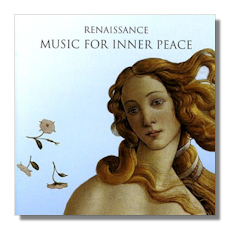
The Internet's Premier Classical Music Source
Related Links
-
Allegri Reviews
Barber Reviews
Bruckner Reviews
Byrd Reviews
Górecki Reviews
Josquin Reviews
Lotti Reviews
Monteverdi Reviews
Palestrina Reviews
Poulenc Reviews
Sheppard Reviews
Tallis Reviews
Tavener Reviews
Tomkins Reviews - Latest Reviews
- More Reviews
-
By Composer
-
Collections
DVD & Blu-ray
Books
Concert Reviews
Articles/Interviews
Software
Audio
Search Amazon
Recommended Links
Site News
 CD Review
CD Review
Renaissance

Music for Inner Peace
- Anton Bruckner: Locus iste in C Major, WAB 23
- Antonio Lotti: Crucifixus
- Claudio Monteverdi: Motet "Christe, adoramus te", SV 293
- Francis Poulenc: Salve Regina, FP 110
- Giovanni Pierluigi da Palestrina: Missa Papae Marcelli: Kyrie
- Gregorio Allegri: Motet "Miserere mei Deus" (Psalm 51)
- Henryk Górecki: Totus Tuus, Op. 60
- John Sheppard: Libera nos
- John Tavener: The Lamb
- Josquin Desprez: Motet "Ave Maria… virgo serena"
- Samuel Barber: Agnus Dei, Op. 11
- Thomas Tallis:
- Anthem "If ye love me"
- Motet "Salvator mundi Domine" (Adesto nunc propitius)
- Thomas Tomkins: When David Heard That Absalom Was Slain
- William Byrd:
- Agnus Dei (Gradualia, Book 1)
- Motet "Justorum animae"
The Sixteen/Harry Christophers
Decca 60249-87012-8 77:58
Summary for the Busy Executive: Some of the music too big for the sound.
This mostly-compilation of tracks from earlier albums results in an uneven program by a world-class group. Harry Christophers's Sixteen stands as one of the première vocal ensembles. They don't shy from difficult repertoire. Indeed, Christophers seems to have created the group for just such scores. I wish I liked the disc more.
In a collection like this – a grab-bag of composers – it's almost inevitable that you'd like some items better than others. The Allegri Miserere has never been one of my favorites. In fact, even with the soprano's famous high C, it bores me into coma. Barber's arrangement of his famous Adagio for Strings, the choral Agnus Dei, always struck me as one of his worse ideas. I like the Adagio fine. It doesn't seem to me to translate very well to choir. Barber's original choral music shows far more interesting part-writing. Górecki's Totus tuus goes on far longer than its slight material can sustain, even though Christophers runs it at a decent clip.
Sometimes a track doesn't work because the music needs more sound than sixteen voices can provide: Allegri's Miserere, Barber's Agnus Dei (again), Lotti's Crucifixus à 8, for example. The best recording of the Barber is a tossup between the Dale Warland Singers and Accentus. I lean toward the latter, because their sound is so rich. The Sixteen's virtue has always included a lean, clear tone which, in this case, sounds a little skimpy.
On the other hand, one particular track succeeds beautifully, even though seeing it in the program may provoke an Oh-no-they're-not-going-to-try-that-are-they. The Tudor composer John Sheppard is noted for his massive choral textures. In Libera nos, however, we get a mere seven parts (2 sopranos, 2 second sopranos, 2 altos, basses) and no tenors. What might sound crowded at the upper end comes across crystal-clear.
The rest suits the group beautifully. Highlights include the Sheppard, of course, Monteverdi's Christe, adoramus te, Bruckner's Locus iste, normally done with large choirs, is so beautifully written that a smaller group can make a lovely effect, although different. Here, the Sixteen emphasize the steely logic of the voice-leading and harmonic progressions. Poulenc's Salve regina, from the Forties, is a paradox: essentially a long melodic line that proceeds in short bursts. The harmonies, though beautiful, always threaten to fall apart. I sense the group hanging on by its fingernails, but so does every other chorus I've heard. The Sixteen stay just on the right side of in tune.
One little puzzle: the track labeled as the Poulenc also contains another piece obviously not by Poulenc. It sounds to me like Monteverdi or Giovanni Gabrieli. I think the first word is "Exsulte." Anybody have an idea?
Copyright © 2008, Steve Schwartz




















